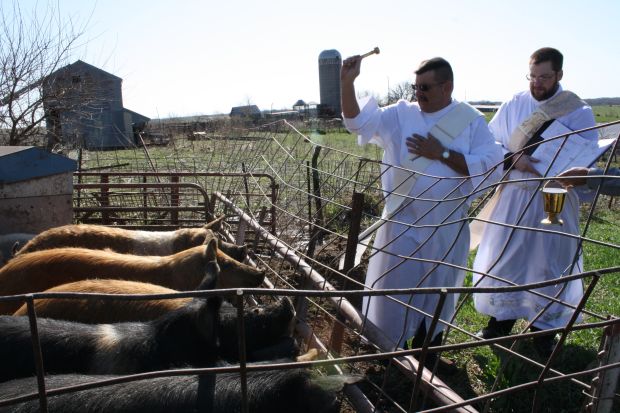CHARITON, Iowa (CNS) — The ancient Catholic tradition of Ember days has been resurrected in the Diocese of Des Moines by a deacon who serves in rural ministry.
Deacon Eric Bertrand, assigned to Sacred Heart Parish in Chariton and Holy Trinity Parish in Lacona, said he was inspired to reintroduce the prayer and fasting traditions of Ember days while reading Pope Francis’ 2013 apostolic exhortation, “Evangelii Gaudium” (“The Joy of the Gospel”).
The pope “talked about reawakening popular devotion,” Deacon Bertrand said. “There was a lot of talking and discernment (among deacons in rural ministry). We started to explore bringing our spirituality out of the church.”
[hotblock]
As a result, priests and deacons will by request make home visits to farmers who would like their seed, livestock, water sources, equipment, tools and land blessed. Farmers are encouraged to contact their local parish.
Kyle Lechtenberg, director of the diocesan Office for Worship, said the Ember day tradition focuses on giving thanks while remembering our dependence on God.
“I grew up on a farm, and you are totally dependent on the water that God provides, and there’s a risk and trust in farming,” Lechtenberg said. “We are so fortunate here that year after year after year the yields are so bountiful. That’s not true everywhere, and that’s a reason to be even more thankful.”
At one time, Ember days were on the liturgical calendar. Such days required fasting and were meant to “thank God for the gifts of nature, to teach men to make use of them in moderation and assist the needy.”
In 1966, Pope Paul VI’s apostolic constitution, “Paenitemini,” addressed and altered fasting guidelines and excluded Ember days as days of fast and abstinence.
Ember days occur four times per year, loosely corresponding to each season and preceding a liturgical feast day: Ash Wednesday in spring, Pentecost in summer, Exhaltation of the Holy Cross in fall and St. Lucy Day in winter.
Deacon Bertrand wants to bring back the message of Ember days while incorporating the spirituality and reverence surrounding agriculture.
“We really need to bring our spiritual life into our everyday life and into our rural occupations and rural activities,” Deacon Bertrand told The Catholic Mirror, newspaper of the Des Moines Diocese. “The care you’ve been given of these items comes directly from God and you’re asking for his blessing and abandoning your works into his hands.”
Deacon Bertrand said he would eventually like to have a special day of prayer and blessing for the public in the fall. City dwellers would benefit as well, he said.
“It’s where their food comes from,” he said. “You recognize the sacrifices of the people, their blood, sweat and tears in bringing that food to them.”
While giving thanks, it’s also important to remember farmers who have been injured or killed, as well as immigrants traveling far and working long hours in the fields to provide for their families, he said.
Ralph Sheve, a farmer and parishioner of Sacred Heart, looks forward to having his farm, equipment and cow/calf operation blessed. He likes the idea of renewing old church traditions and feels it can only help him spiritually.
“I just feel like in this day and age, the devil is working harder and harder to get my soul, and so anything I can do I’m going to do it,” Sheve said.
Farming can also be a dangerous occupation, and Sheve is thankful he has not faced serious injury or death in his family.
“In blessing my farm, I hope it slows me down a little bit and makes me appreciate everything,” he explained. “I just feel very blessed. If I can do anything to enable me to grow more spiritually when I’m out there doing my physical work, that’s what I’m all about.”
***
Collins is a multimedia journalist on the staff of The Catholic Mirror, newspaper of the Diocese of Des Moines.
PREVIOUS: Couple’s ancestors ministered to lepers, hanged for witchcraft
NEXT: Wisconsin diocese’s programs help Latino families put faith into action




Share this story